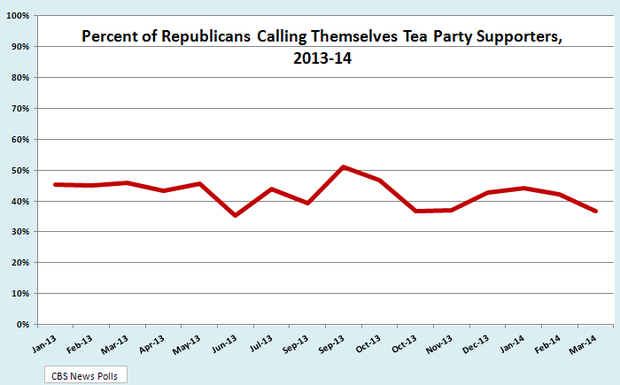The Republican establishment won a battle - but who’ll win the war?
In the ongoing fight over the Republican party's direction, everyone chalked up a win for the "establishment" side this week, as tea party candidates fell short in bids against incumbent House members and, most notably, for the North Carolina Senate nomination nod won by Thom Tillis.
But in American politics sometimes winning isn't just about coming out on top in elections, odd as that may sound at first. It's often about influence - especially influence over those who do win - and in that regard the tea party still has plenty.
Polls have shown rank and file Republicans have been, on balance, positive about the tea party's influence on the GOP. When CBS News oversampled Republicans in order to talk to a robust sample of them this February, the polls showed only 17 percent said the tea party had too much influence in their party. Many more, 29 percent, said it had too little; they'd presumably like even more. The largest number, 37 percent, called tea party influence the right amount. (And more than three times as many had favorable views of the movement than negative ones.)
The percent of Republicans who call themselves tea party supporters hasn't waivered much over the last year or so. It has hovered at around 40 percent, spiking a bit during the government shutdown as partisans rallied, and continued into this spring.
Politically, that pushback from the "establishment" in these primaries can seem far more practically than ideologically motivated as eyes turn toward November; about finding candidates more apt to run effective fall campaigns and survive the scrutiny of five months in the spotlight. That often means those who've been in tough races before. Today's candidates like Tillis, or like incumbent Sen. John Cornyn who easily turned back a tea party challenge in Texas in March, are staunch conservatives by almost any empirical measure; nor are Republicans, establishment or otherwise, running primary campaigns centered on compromising with Democrats.
Meanwhile, Gallup released a report Thursday showing tea party support is down from its 2010 levels, but does remain substantial today. And Scott Clement points out that the enthusiasm of tea party groups - they'll vote - ensures they'll be heard from as well. A new Brookings Primary Project examined and coded the relatively large number of primary candidates from Tuesday's races concluded that the tea party "remains a force to be reckoned with within the Republican Party" even though those candidates did not fare well Tuesday.
And most of all there's still a long primary calendar ahead. In Kentucky, Senate Minority Leader Mitch McConnell has still had to contend with a challenge, though the odds are in his favor; in Nebraska next Tuesday, in Mississippi and Iowa in early June, and then Aug. 5 in Kansas, there are "establishment" picks and Republican incumbents who look like they'll be tested as well. Even if all prevail - which is a perfectly possible outcome - their stances and campaigns will probably continue to be influenced by their need to court, or at least be acceptable to, the most conservative parts of the base.
So, we can keep score on who gets to pick its candidates, which is important, but the battle for influence hardly looks like it'll be settled any time soon.

